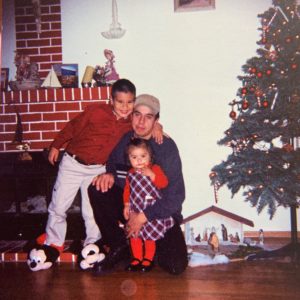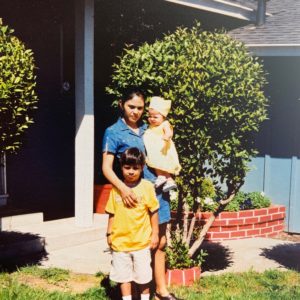Providing equitable quality of care for all patients, regardless of race, culture, and socioeconomic status has become our healthcare system’s biggest challenge. In the United States it is difficult for underserved communities such as the Latinx Community to receive treatment, making healthcare be experienced as a luxury rather than a necessity.
My story begins 20 years ago, when my parents immigrated to this country and adopted it as their own. Like most recent immigrants, my parents didn’t know a lick of English and with that, they were expected to communicate fluently in this new place they called home.
One day, I remember my mom was washing the dishes and at the bottom of the sink was a broken glass cup. The pile of dishes was big enough to cover the broken glass, leading my mom to think everything was fine. As soon as she reached down to the very bottom of the sink, she felt a sharp edge run across her hand, causing a stinging sensation. She lifted her hand and saw a deep gash that penetrated the palm of her hand. Later that day, she had tried every home remedy she could think of to let the cut heal but it didn’t seem like it was getting any better.

Luis Garay and family.
Days after the incident, my mom, my baby sister, and I went down to the local community clinic to receive help. I will never forget the embarrassment and frustration my mom felt when a child was required to translate her symptoms to the physician. When describing the pain, feeling, and sensation, there was always something that got lost in translation because sometimes there were no words that could translate directly from Spanish to English. Experiencing this for the first time made me feel vulnerable because even though I was doing everything in my power to help the problem was not being solved. Luckily there was a nurse walking by who heard me struggling and was able to translate everything to the physician. From that day on, I knew there was a disconnect in our healthcare system and as I grew older, I came to learn that this issue that my family and I faced was known as a language barrier.
Even though this incident happened 20 years ago, it’s still a common issue found in our healthcare system. In the article Caring for Latino Patients Gregory Juckett, MD, MPH states, “Many hospitals and offices lack trained interpreters and rely on interpretation by bilingual staff or even the children of patients”.
Like my story, there are similar versions that are constantly being repeated throughout our healthcare system. The lack of cultural competency and the basic knowledge of communication in our healthcare system has negatively impacted the lives of many Latinx people.
According to the article Language barriers contribute to health care disparities for Latinos in the United States of America “communication difficulties make it much harder to fully explain symptoms and to ask questions, to follow through with filling prescriptions, to believe that doctors understand their medical needs, to understand doctors’ recommendations, and to see doctors as often as needed”. With this being said, this may be a reason why there is such a large upward trend in many health conditions including heart disease, diabetes, and many other non-communicable diseases in the a Latinx community.
According to Opinion: California Must Address a Statewide Latino Physician Shortage there are approximately 405 non-Hispanic white physicians for every 100,000 non-Hispanic white patients, but only 46 Latino physicians for every 100,000 Latino patients. These number continue to rise, especially in medically underserved areas like Merced, Stockton, and other cities in the California Central Valley

Luis Garay and family.
There have been countless times when language barriers have prevented the Latinx communities to seek medical treatment. As a result, herbal medicine and home remedies are alternatives that may be more culturally preferred by the Latinx population because they don’t have to face the stress and hurdles of communicating with a physician.
Knowing that this is still a living issue has led us to believe that receiving adequate medical treatment is truly a privilege in today’s society. We need to meet the needs of our population and create a workforce that not only provides equitable healthcare but are also culturally and linguistically appropriate. Accepting that our healthcare providers have “low health literacy” when communicating with diverse cultures should not be an option anymore.
Part of the solution is to diversify the face of medicine and cultivate a workforce that not only speaks the language but also looks like the population they are serving. Employing physicians that reflect the experiences and cultures of this community group can aid in bridging the barrier to accessing quality care. My ultimate goal is to become a physician who serves vulnerable communities, including the Latinx and other communities of color. According to research from the UCLA Latino Policy & Politics Initiative, Latinos represent over 40 percent of California’s population but make up less than 12 percent of graduating physicians from the state’s medical schools
My interest in healthcare stems from experiencing this constant struggle, it has motivated me to become the bridge between our underserved families and the proper health care they deserve. As an aspiring Latino Healthcare provider, I want to blend the medical knowledge I will obtain and the culture I have lived, learned, and identified with, so that I can provide equitable healthcare for all. I will remember to practice cultural humility to provide care for the patient beyond symptoms in their medical charts. Serving as a leader in my community is another way I wish to pay it forward and give back to those who have a similar upbringing like myself. I want to provide mentorship to the younger Latinx population who also want to pursue a degree in medicine and guide them on their paths to higher education and provide greater opportunity just as my parents did when they first came to this country.
 Translate
Translate
